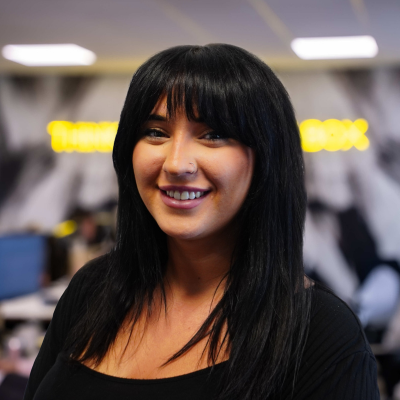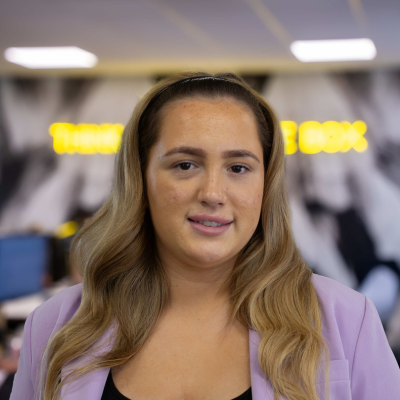Interview with a Speech and Language Therapist: Clare Bates
02 May, 20241-2 minutes
In this blog, you will learn:
- The career path of a Speech and Language Therapist.
- How to balance self-care and professional growth as a Speech and Language Therapist.
- Key qualities that make a successful Speech and Language Therapist.
- Rewarding aspects of speech and language therapy.
- Where the latest Speech and Language Therapist jobs are and how to apply for them.
A recent survey by the Royal College of Speech and Language Therapists found an average vacancy rate of 25% in children’s speech and language therapy services in England and 24% in adult services.
As a result, there are not enough Speech and Language Therapists to meet demand. The speech and language therapy industry is trying to encourage more people to take up this rewarding career path and we’ve been catching up with Speech and Language Therapist, Clare Bates, to discover what advice she’d give to aspiring Speech and Language Therapists.
With over 3 years of experience, Clare has a passion for supporting children and young people with autism spectrum disorders and SEND. She’s also committed to delivering high quality and evidence based care.
Clare, tell us about your career journey so far
My career journey has been somewhat atypical. I started off as a Teaching Assistant in a special needs school. This was where I decided that I wanted to become a Speech and Language Therapist.
I had low GCSEs which I had to retake and I also had to complete an access to nursing diploma to be able to apply for university. I achieved all of these goals and got into Queen Margarate University in Edinburgh where I was diagnosed with dyslexia. I managed to complete my degree and I moved back home to Suffolk.
I then worked as a Speech and Language Therapist at Addenbrookes Hospital working within the stroke ward as well as working as a sales representative at Greene King Brewery.
I then secured a full time position as a Speech and Language Therapist in a private SEN school.
I’ve now worked there for over 3 years and have also completed some additional work with a private therapy clinic, completing autism diagnostic interviews with parents and carers.
What inspired you to become a Speech and Language Therapist?
My inspiration for this career path stems from my time working as a Teaching Assistant. I witnessed a lot of behaviour and frustration which was a result of the children’s difficulties with communication.
I worked alongside a Speech and Language Therapist in the school who taught me different communication methods to support one particular student who was non-speaking when he started school.
I was responsible for passing on information and sharing the communication methods with the teaching staff and family members. By the time I was leaving the position, I had witnessed the child’s verbal communication develop to single word level and had feedback from his parents on how much their home life had improved. These experiences showed me how important communication is and how rewarding it is to be able to support families through these difficulties.
What does a typical day in your role as a Speech and Language Therapist look like for you?
My working day starts at 8:10 am when I arrive at school. I'll check my timetable for the day and write a list of additional activities that need to be addressed in order of priority.
I will then provide 2 sessions which might be 1:1 or small group therapies, each session lasting for 45 minutes. I’ll then spend 45 minutes writing up my notes for the sessions and reviewing individual goals for the students.
During break time, I'll go to the food hall and supervise our kitchen volunteer students. Volunteering was an initiative created by myself to not only help the very busy kitchen staff but to support the development of the student’s communication skills and confidence. They enjoy feeling part of the school and interacting with their peers.
After the break, I will go on to complete 1 to 2 sessions which are either small groups or 1:1, occasionally I will do joint sessions with the school’s Occupational Therapist and Mental Health Practitioner.
When lunchtime arrives I run 2 clubs a week, one is a Warhammer club and the other is Dungeons and Dragons. I started these clubs to provide our students with the opportunity to create peer relationships that were based on shared interests and provide opportunities to meet people they may not normally interact with during the school day.
Dungeons and Dragons has been so popular that it had to be split into two groups and some of our students have benefited socially from the clubs. I also have 2 lunch duties where I will either supervise on the playing field, which is nice as the students like to chat to me, or I will help serve the lunch in the dinner hall.
After lunch break, I’ll complete a further 1 to 2 sessions with the students until 4pm when the school day ends. I tend to stay a little longer to round things up and prepare for the following day. This is generally between 30 minutes and 1 hour, then I head home.
In addition to the typical day mentioned, the school’s Mental Health Practitioner and I have started working with The Bridge Project, who are dedicated to providing a nurturing environment to help those living with learning disabilities, dementia, and mental health issues.
They run a weekly community café in a local art centre and have kindly allowed our students to volunteer to help run the café. This provides them with an excellent opportunity to develop work experience and grow their confidence in interacting with the public, whilst being supported by myself and the Mental Health Practitioner.
What specific areas of speech and language therapy do you find particularly rewarding?
For me, I find the whole of speech and language therapy rewarding! However, a specific area I find particularly rewarding is being able to build a good sense of understanding and trust with the students. I also love seeing my students achieve goals that they find very challenging.
Another area I find rewarding is achieving goals within the school. For example, I've recently provided level 3 Elklan training to some of the staff and we'll be working towards gaining the Communication Friendly Setting accreditation for the school. I feel that this will benefit the school and our students so much.
In your opinion, what are the key qualities that make a successful Speech and Language Therapist?
In my opinion, to become a successful Speech and Language Therapist you need to have:
- Good communication skills.
- Empathy.
- Creativity.
- Good problem solving skills.
- Strong ethics.
- Curiosity and a drive to learn.
What challenges do you commonly face in your role, and how do you overcome them?
For me, finding time to complete all of the administrative tasks is a big issue as there is only one of me (Speech and Language Therapist) in the whole school.
This is overcome through prioritisation and time management when creating my termly timetable. I focus on tasks such as assessments and report writing as well as communicating the needs of the school.
What advice would you give to someone considering a career in speech and language therapy?
I would say go for it. I would recommend trying to get experience in as many different areas as possible. I was very lucky and had some great and varied placements while completing my degree. Locum would be a good way of doing this if you can move about.
Do you have any specific goals or aspirations for your career as a Speech and Language Therapist?
I love working in a school, but my ideal would be to do a split role where I work in the school for three days of the week and then a clinical role the other two days. I feel like it would be a good way for me to gain varied work experience.
I also have an interest in neurodiversity and would like to further expand my knowledge in that area to a specialist level, as well as gaining more clinical experience and work with some other Speech and Language Therapists.
What do you do to balance self-care and professional growth and how has this positively impacted you and your work?
I will admit that I struggle with making sure that I balance self-care during term time. Most of my self-care during this time is making sure that I take at least one break during the day so that I can talk to my colleagues and have some lunch whilst not sitting in front of my laptop.
However, the benefits of working at a school are that we get lots of holidays so I work hard during the term, and make sure that I have something to look forward to during the holidays. This motivates me to put the dedication and work in during the term so that I can enjoy my holiday without feeling guilty or worrying about completing lots of leftover work.
In terms of growth, I feel that it is important to constantly be developing your knowledge throughout your career. I've completed lots of training in general areas which will benefit myself, the school, and the students. This includes Lego therapy, Elklan, and Colourful Semantics, amongst others.
They're all very useful and are used frequently. However, I feel it’s important to also try and develop your skills in areas that really interest you as an individual. For example, I’m interested in neurodiversity so naturally, I wanted to develop my skills in the diagnostic area. This resulted in me completing training in the Autism Diagnostic Interview-Revised (ADI-R) and the Autism Diagnostic Observation Schedule-2 (ADOS-2).
If your employer isn't open to providing particular training to you and you can’t fund it yourself, there is potential to apply for minor grants through the RCSLT. I will be applying to hopefully fund further training in gestalt language processing and situational mutism as I find these areas very interesting.
Speech & Language Therapist jobs
If you’re searching for your next Speech & Language Therapist job, why not take a look at the latest vacancies, or simply upload your CV to be notified when a relevant position becomes available.
Recruit Speech & Language Therapists
As healthcare recruitment specialists, we support local authorities and private sector businesses nationwide with their temporary, interim and permanent recruitment needs.
If you’re struggling to fill a Speech & Language Therapist vacancy, why not get in touch with our healthcare specialist, Natalie Boaler on 01772 954200 to see how we can help?
Share your experience
Every individual brings a unique set of experiences, thoughts, and insights to the table. We believe in giving a voice to a community of professionals to inspire positive change and champion reform in the healthcare sector.
If you work in the healthcare sector and would like to share your own personal and professional experiences, we’d love to hear from you. Perhaps you have a different perspective, could offer a fresh angle, or want to challenge assumptions.
Simply reach out to our Head of Content, Nicole Sherwood, to discuss a collaboration which makes your voice count.
Who is Spencer Clarke Group?
Established in 2017, we’re a vibrant and progressive recruitment agency based in the heart of the North West.
We continually reimagine the recruitment process to challenge convention and defy expectations; from creating a better recruitment experience to remodelling employee engagement, we thrive off doing things differently and turning heads along the way.
We operate in two sectors:
In eleven specialisms:
Healthcare, Social Care & Nursing
Corporate Functions & Business Support





